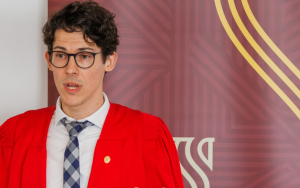
Prof Bernard Bekker delivers his inaugural lecture.
Prof Bernard Bekker wants to help plan SA's future power system
- Prof Bernard Bekker from the Department of Electrical and Electronic Engineering delivered his inaugural lecture on 6 November 2025.
- He uses models and simulations to inform planning for South Africa’s future electricity system.
- He provides valuable insights for decision-makers in government and industry.
Prof Bernard Bekker from the Department of Electrical and Electronic Engineering in the Faculty of Engineering at Stellenbosch University delivered his inaugural lecture on Thursday 6 November 2025. The title of his lecture was “‘It depends’: using models to support South Africa’s future electricity system”.
Bekker, who also holds the NRF SARChi Chair in Power Systems Simulation, spoke to the Corporate Communication and Marketing Division about the importance of using models and simulations to inform planning for South Africa’s future electricity system by decision-makers in government and industry.
Tell us more about your research and why you became interested in this specific field.
My students and I study the impacts of increasing variable renewable energy generation (mostly wind and solar), distributed energy storage, and changing customer behaviour on the traditional electrical power system. Electricity is a core enabler of our civilisation, and the planning and operation of the electrical power system is rapidly changing, making this a fascinating field to study.
How would you describe the relevance of your work?
Our research activities are ultimately aimed at supporting the system operation, network planning and long-term capacity expansion planning functions within the South African power industry. The main way we contribute to this is by building models and simulations that inform decision-makers in government and industry about the consequences of their decisions, that build confidence in innovations, that highlight incorrect storylines, etc.
Can you give examples of how your research is applied in real-world contexts?
Our models can, for example, clarify which controllable factors have the greatest impact on the risk of future load shedding, or help planners decide which parts of the distribution network are most likely to be overloaded in a future with many electric vehicles.
How are models used to plan South Africa’s future electricity system?
It’s very difficult to plan for the future if you only have a vague idea of how your decisions will affect this future. Models, i.e. simplifications of reality, form the basis for simulating possible futures, thereby providing decision-makers with better information about the outcomes of their decisions.
In what ways can academia help make electricity planning clearer and in the public interest?
Academic research is (or at least strives to be) unbiased and grounded in facts, and as such can be an unfettered and non-partisan voice in the public electricity planning debate. Such a voice is necessary, and in the public interest.
Looking into your crystal ball, what developments do you see in your field of study?
I don’t need a crystal ball: The developments are already here, providing electrical engineers and researchers with many stimulating problems to work on! The developments can be summarised as the ‘four Ds’: decarbonisation, decentralisation, deregulation and datafication.
The higher education environment can be challenging. What keeps you motivated when things get tough?
Working with my post-graduate students is incredibly rewarding.
How do you spend your free time?
My wife and three children (and golden retriever) love the outdoors as much as I do, so our weekends are typically filled with mountain biking, trail running, swimming and spending time in the amazing Western Cape nature.



